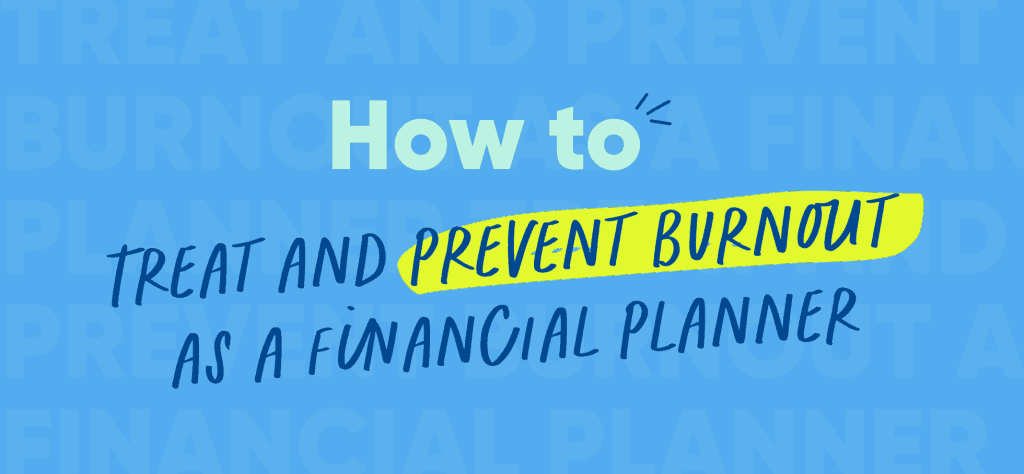How to Treat and Prevent Burnout as a Financial Planner

If you’re a financial planner and feel like you’re burned out, you’re not alone. In fact, 85% of respondents to a recent Twitter poll I created said they have experienced burnout in the last six months.
Burnout is unfortunately common these days among professionals in many industries. It’s an especially challenging time for financial planners who are experiencing burnout on top of the stress of a difficult market.
So, what’s the solution? How do we treat burnout? And how can we prevent it from happening in the future?
Take Care of Yourself
Many people experience burnout because they prioritize work over most other aspects of their lives. And this doesn’t just mean workaholics who put in 80+ hours per week.

When you consistently lose sleep, weekends, leisure activities, or time with your family because of work, you’re not taking care of yourself. And even if you can keep up this unbalanced schedule for a little while, eventually something snaps.
Self-care is important for everyone, but it’s especially vital for those who work in caregiving professions. And make no mistake, financial planning is a caregiving profession! We spend our days building relationships with people and taking on their problems as our own so we can develop solutions. This type of work can be emotionally and mentally exhausting, especially when you don’t give yourself enough breaks.
So take care of yourself first. You’ll build a better quality of life for yourself and improve your customer service capabilities too.
Prioritize Rest
It’s impossible to overstate the importance of rest. Without enough rest, your work, personal life, and family all suffer. If you do nothing else on this list, at least find a way to get more rest.
I experienced firsthand what happens when you don’t prioritize rest. Last year, I had a baby, hired new employees, and ended up taking very minimal maternity leave. By December, I was so busy during the day that I needed to work in the evenings to keep up with things.
But I just couldn’t. I desperately needed those evenings to rest, and I couldn’t continue working at that insane pace. I committed to resting in the evenings, and my life and my work are much better for it.
Stop Equating a Busy Schedule With Success
There’s a lot of cultural pressure to go “full throttle” all the time, especially in our careers. And that’s OK for short periods of time. For example, spending some extra hours studying for your CFP® exam is reasonable. But you can’t maintain that pace all the time.
When you’re going all out all the time, you end up neglecting what your body needs. This often shows up in multiple areas: poor nutrition, lack of sleep, and high stress. Your health and happiness are more important than your career. It’s not worth losing them just to say you’re “hustling” all the time.

Figure Out Ways To Pull Back
If you realize your schedule is pushing you toward burnout, take some time to figure out how you can slow down. It can be hard if you feel like you’re letting your boss (or yourself) down, but the truth is that it’s better to pull back now so you don’t completely burn out later.
In some cases, that might mean you let miss a deadline or two or drop the ball on a project. But sometimes that’s for the best because it shows where things are unsustainable.
As someone who owns her own firm, I would rather see some unfinished tasks if it means my employees are taking care of themselves. Plus, when those balls are dropped, it lets me know exactly where I need to spend more resources or hire more people.
Create Small Pauses in Your Schedule
Taking a full vacation is a great way to get some rest and fight against burnout, but it isn’t always possible. And honestly, a vacation here and there won’t fix things if the rest of your time is spent in an unsustainable hustle.
Focus on finding small ways to add some rest and leisure into your days. Read a book. Take a few minutes each day to meditate or do breathwork exercises. Go for a walk. Prioritize little things that force you to hit pause on your busy schedule.
Focus on the Essentials
One of the best ways to avoid burnout altogether is to be proactive about prioritizing your tasks. At some point (and maybe often), you’ll have too many things to do and not enough time to do them all. You have to figure out what to spend your time and energy on, and that’s where prioritization comes in.

Take a little time to get a clear picture of what absolutely needs to get done. Once you have that, make a plan for completing those tasks. And let all the nonessentials go.
Maybe you’ll pick up those tasks later when the more important ones are done. Or maybe you’ll realize that they’re not even necessary and drop them entirely. Either way, you will have completed the necessary things and given yourself the chance to figure out what you want to prioritize next.
Take Steps To Recover From Burnout
There are a lot of toxic sides to work culture, and burnout is normalized among many professionals. But it shouldn’t be like that! Burnout is a sign that something’s wrong, and it’s not something you should just ignore in favor of more “hustle.”
The truth is that burnout can negatively affect every area of your life, not just your work. If you’re feeling burned out, it’s vital to start a recovery plan right away. Then, figure out what you can do to reduce your risk of burning out in the future. Getting enough rest, prioritizing your tasks, and taking care of yourself are all great ways to fight against burnout.
Have you ever experienced burnout? How did you recover? What are your tips for avoiding it? Let us know your thoughts in the comments.
Want more tips and resources for growing your financial planning career? Join the Amplified Planning community! When you sign up, you’ll get access to our weekly newsletter full of timely topics and our online forum where you can engage in deep discussions with financial professionals at all stages of their careers. Join Amplified Planning today!
